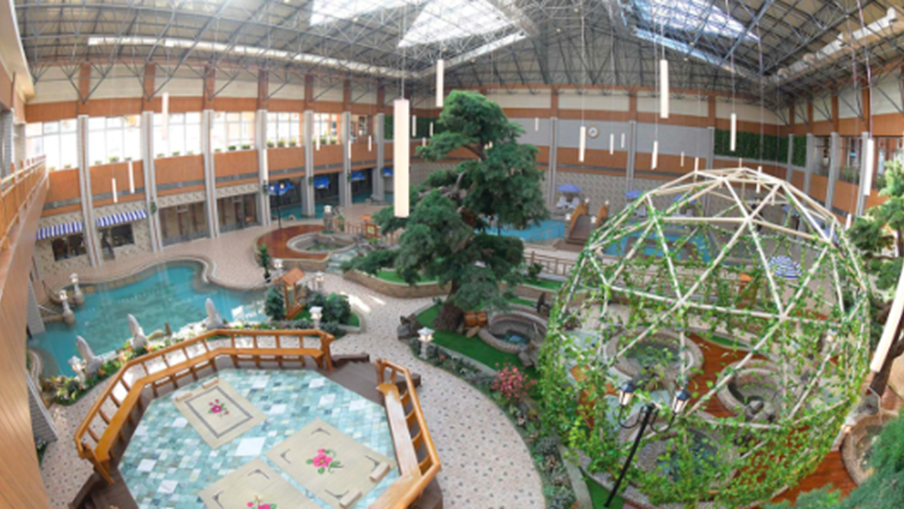As North Korea adapts its economy to survive under sanctions, Pyongyang is turning to medical tourism, a sector not subject to international restrictions.
Construction was recently completed of a new ski resort in the North Korean mountains, as well as other major projects, including a hot spring with purported healing effects. And Rodong Sinmun, a ruling party newspaper, reported in December about the launch of the “Treatment Tourism Exchange Corporation,” which is preparing medical tourism for domestic and foreign visitors.
One such hot spring resort with reported healing effects, the Yangdok Hot Springs and Culture Resort, opened Friday for local visitors, North Korean media reported. Located in South Pyongan Province, construction on Yangdok Hot Springs was finished in early December.
The complex includes a hot spring treatment center, multi-story residential houses, a ski slope and a horse-riding park. Reservations were already being made through the Pyongyang Koryo International Travel Company, according to a North Korean news broadcast on Thursday.
Though the media coverage focused on domestic visitors, a visit to Yangdok Hot Spring Resort was part of a nine-day winter holiday tour package, offered by Singaporean travel agency Universal Travel Corporation Pte. Ltd. late last year. Universal Travel Corporation is the Singaporean representative of Air Koryo, as well as North Korea’s official tourism organization, Korea International Travel Company, which is overseen by the North Korea National Tourism Bureau.
Yang Moo-jin, a professor at the University of North Korean Studies in Seoul, told Reuters last month that the natural tourist attractions offered by North Korea may appeal to Chinese tourists. Chinese tourists are visiting North Korea in record numbers, travel industry sources told AFP in June. Chinese President Xi Jinping promised Kim Jong Un that month during a visit to Pyongyang that he would send 2 million tourists to North Korea.
Domestic and foreign tourists will be able to receive various services, including access to hot spring baths and mineral baths, via the “Treatment Tourism Exchange Corporation,” Rodong Sinmun reported Dec. 6. Hot spring resorts appear to be a centerpiece of North Korea’s plan to become a self-dependent economy, as the mineral water of the hot springs are central to “Treatment Tourism Exchange Corporation,” which was also launched in December 2019.
The “Treatment Tourism Exchange Corporation” encourages visitors to not only enjoy the scenery, but also receive medical services, as the mineral waters of the hot springs can help treat neuralgia, arthritis, and heart and skin ailments, according to the Rodong Sinmun article.
The medical tourism effort comes as Kim Jong Un acknowledged, in a report delivered at a party plenary hearing at the end of 2019, that North Korea will “have to live under the sanctions.” He ordered a reorienting of the economy to address “our immediate struggle under the present internal and external situation.” Sanctions on Pyongyang have tightened further in recent weeks, as a United Nations measure requiring repatriation of North Korean laborers came into effect. The U.S. on Tuesday designated two companies for their roles in helping North Korea export workers in violation of the U.N. restrictions.
During the plenary, Kim stressed the importance of taking practical measures to further strengthen the “independent economy” of North Korea, including through economic development. One such development measure appears to be investing in North Korea’s tourist sector, specifically through “treatment tourism,” according to North Korean media. Another area of economic expansion is through the sale of North Korean art abroad, especially at exhibitions in China.
